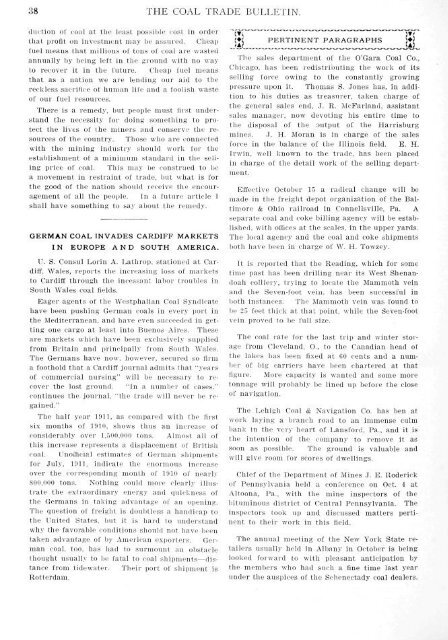u,.:- • - Clpdigital.org
u,.:- • - Clpdigital.org
u,.:- • - Clpdigital.org
Create successful ePaper yourself
Turn your PDF publications into a flip-book with our unique Google optimized e-Paper software.
38 THE COAL TRADE BULLETIN.<br />
duction of coal at the least possible cost in order<br />
that profit on investment may lie assured. Cheap<br />
fuel means that millions of tons of coal are wasted<br />
annually by being left in tbe ground with no way<br />
to recover it in the future. Cheap fuel means<br />
that as a nation we are lending our aid to the<br />
reckless sacrifice of human life and a foolish waste<br />
of our fuel resources.<br />
There is a remedy, but people must first understand<br />
the necessity for doing something to pro<br />
tect the lives of the miners and conserve the re<br />
sources of tbe country. Those who are connected<br />
with the mining industry should work for the<br />
establishment of a minimum standard in the sell<br />
ing price of coal. This may be construed to be<br />
a movement in restraint of trade, but what is for<br />
the good of the nation should receive the encouragement<br />
of all the people. In a future article I<br />
shall have something to say about the remedy.<br />
GERMAN COAL INVADES CARDIFF MARKETS<br />
IN EUROPE AND SOUTH AMERICA.<br />
U. S. Consul Lorin A. Lathrop. stationed at Cardiff,<br />
Wales, reports the increasing loss of markets<br />
to Cardiff through the incessant labor troubles in<br />
South Wales coal fields.<br />
Eager agents of the Westphalian Coal Syndicate<br />
have been pushing German coals in every port in<br />
the Mediterranean, and have even succeeded in getting<br />
one cargo at least into Buenos Aires. These<br />
are markets which have been exclusively supplied<br />
from Britain and principally from South Wales.<br />
The Germans have now. however, secured so firm<br />
a foothold that a Cardiff journal admits that "years<br />
of commercial nursing" will be necessary to re<br />
cover the lost ground. "In a number of cases."<br />
continues the journal, "the trade will never be regained."<br />
The half year 1911, as compared with the first<br />
six months of 1910, shows thus an increase of<br />
considerably over 1,500,000 tons. Almost all of<br />
this increase represents a displacement of British<br />
coal. Unofficial estimates of German shipments<br />
for July, 1911, indicate the enormous increase<br />
over the corresponding month of 1910 of nearly<br />
800,000 tons. Nothing could more clearly illustrate<br />
the extraordinary energy and quickness of<br />
the Germans in taking advantage of an opening.<br />
The question of freight is doubtless a handicap to<br />
the United States, but it is bard to understand<br />
why the favorable conditions should not have been<br />
taken advantage of by American exporters. German<br />
coal, too, has had to surmount an obstacle<br />
thought usually to be fatal to coal shipments—distance<br />
from tidewater. Their port of shipment is<br />
Rotterdam.<br />
<strong>•</strong> PERTINENT PARAGRAPHS <strong>•</strong><br />
The sales department of the O'Gara Coal Co..<br />
Chicago, has been redistributing the work of its<br />
selling force owing to the constantly growing<br />
pressure upon it. Thomas S. Jones has, in addi<br />
tion to his duties as treasurer, taken charge of<br />
the general sales end, J. R. McFarland, assistant<br />
sales manager, now devoting his entire time to<br />
the disposal of the output of the Harrisburg<br />
mines. J. H. Moran is in charge of the sales<br />
force in the balance of the Illinois field. E. H.<br />
Irwin, well known to the trade, has been placed<br />
in charge of the detail work of the selling department.<br />
Effective October 15 a radical change will be<br />
made in the freight depot <strong>org</strong>anization of the Baltimore<br />
& Ohio railroad in Connellsville. Pa. A<br />
separate coal and coke billing agency will be estab<br />
lished, with offices at the scales, in the upper yards.<br />
The local agency and the coal and coke shipments<br />
both have been in charge of W. H. Towzey.<br />
It is reported that the Reading, which for some<br />
time past has been drilling near its West Shenandoah<br />
colliery, trying to locate the Mammoth vein<br />
and the Seven-foot vein, has been successful in<br />
both instances. The Mammoth vein was found to<br />
be 25 feet thick at that point, while the Seven-foot<br />
vein proved to be full size.<br />
The coal rate for the last trip and winter storage<br />
from Cleveland, O., to the Canadian head of<br />
the lakes has been fixed at 60 cents and a number<br />
of big carriers have been chartered at that<br />
figure. More capacity is wanted and some more<br />
tonnage will probably be lined up before the close<br />
of navigation.<br />
The Lehigh Coal & Navigation Co. has ben at<br />
work laying a branch road to an immense culm<br />
bank in the very heart of Lansford, Pa., and it is<br />
the intention of the company to remove it as<br />
soon as possible. The ground is valuable and<br />
will give room for scores of dwellings.<br />
Chief of the Department of Mines J. E. Roderick<br />
of Pennsylvania held a conference ou Oct. 4 at<br />
Altoona, Pa., with the mine inspectors of the<br />
bituminous district of Central Pennsylvania. The<br />
inspectors took up and discussed matters pertinent<br />
to their work in this field.<br />
The annual meeting of the New York State retailers<br />
usually held in Albany in October is being<br />
looked forward to with pleasant anticipation by<br />
the members who had such a fine time last year<br />
under the auspices of the Schenectady coal dealers.
















